Key takeaways:
- Certifications in cybersecurity serve as essential stepping stones, providing foundational knowledge and boosting confidence and career prospects.
- Choosing the right certification path aligned with personal interests and career goals significantly impacts professional development.
- Practical study strategies, such as breaking down information and incorporating real-world scenarios, enhance understanding and retention of complex topics.
- Certifications can lead to increased job opportunities and salary potential, validating the hard work and dedication invested in one’s education.
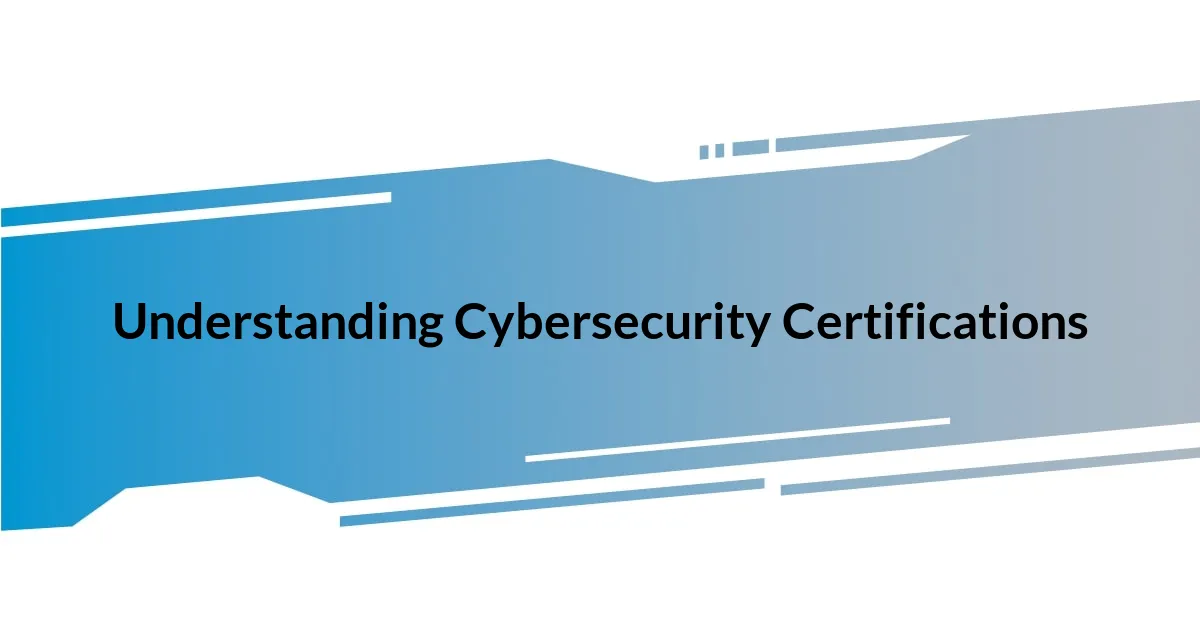
Understanding Cybersecurity Certifications
Cybersecurity certifications are more than just badges to display on your resume; they represent a commitment to mastering a complex and ever-evolving field. I remember the excitement of earning my first certification—it felt like unlocking a new level in a game I had devoted countless hours to. You might wonder, why bother with certifications at all? For me, they were essential stepping stones, providing the foundational knowledge needed to tackle real-world security challenges.
When delving into various certifications, it’s crucial to recognize the different paths available. Some focus on specialized areas, like penetration testing or threat intelligence, while others, such as CompTIA Security+, provide a broader overview. Reflecting on my journey, I chose the CISSP (Certified Information Systems Security Professional) as my next goal. It was a challenging endeavor, but the knowledge I gained transformed my understanding of security frameworks and risk management. It makes me think—have you considered how choosing the right certification can impact your career trajectory?
As I navigated the landscape of certifications, I often grappled with the idea of whether they truly reflect one’s expertise in the field. It’s not uncommon to feel overwhelmed by the sheer number of options. Yet, I found that each certification, while demanding, cultivated my confidence and skillset. Have you ever felt that moment of clarity after finally grasping a difficult concept? That’s what certifications can do—they can illuminate your path, making the complex world of cybersecurity seem a little less daunting.
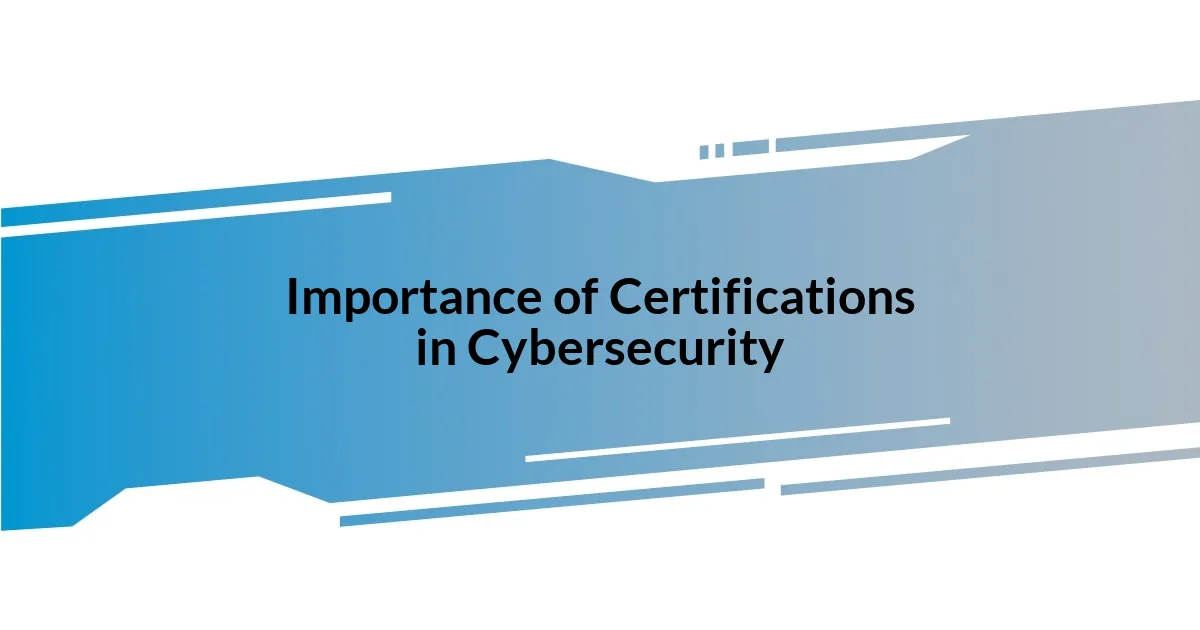
Importance of Certifications in Cybersecurity
Obtaining certifications in cybersecurity is vital for several reasons, and I’ve experienced the impact firsthand. For instance, when I earned my CompTIA Security+ certification, it not only boosted my self-confidence but also garnered respect from my peers. There’s an undeniable validation that comes from proving your skills through certification, and it opens doors to opportunities that might have otherwise remained closed.
- Certifications demonstrate your knowledge and commitment to the field.
- They can lead to higher job prospects and better salary potential.
- Some employers prioritize candidates with certifications, seeing them as a benchmark for skills.
- Each certification builds a foundation for deeper understanding, enriching your problem-solving abilities.
- They create a network of like-minded professionals and mentors, fostering growth and collaboration.
Reflecting on my experience, I recall the instant gratification I felt when I received my certification. It wasn’t just a piece of paper; it was a testament to my perseverance and hard work. Even now, I can’t help but feel a sense of pride when I see others pursuing their certifications, knowing that they are equipping themselves with the necessary tools to face the challenges in cybersecurity.
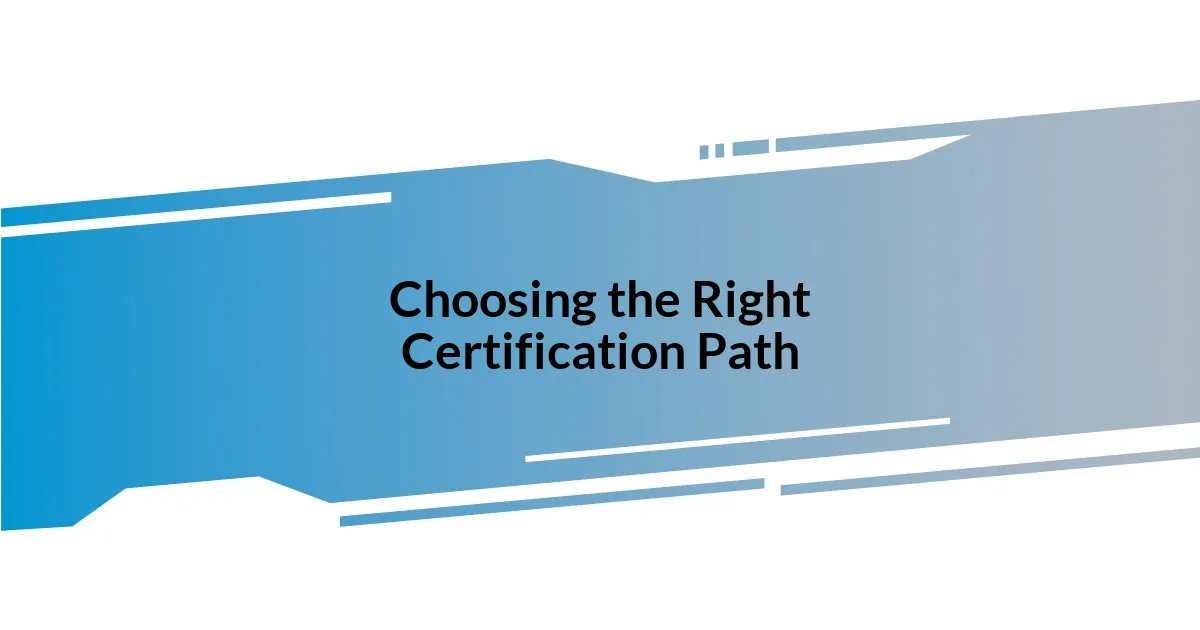
Choosing the Right Certification Path
When considering your certification path in cybersecurity, it’s essential to align your choices with your career goals. I vividly remember being at a crossroads, unsure if I should specialize in ethical hacking or go for a broader role in security management. It hit me that recognizing what part of cybersecurity truly excites you can dramatically shape your learning journey and future opportunities. Have you had moments where a particular topic sparked your interest? It’s those moments that can guide your decision.
Not all certifications hold the same value for every career stage. As I transitioned from an entry-level role to more advanced positions, I found that certifications like Certified Information Security Manager (CISM) enhanced my leadership capabilities. It was fascinating to see how each certification I pursued interconnected, helping me build a comprehensive skill set. If someone asked me what I wish I had understood earlier, I’d advise them to consider not just the difficulty of a certification but also its relevance to the roles they aspire to. Tailoring certifications to your career path feels like crafting a personalized toolkit for your future.
To evaluate your options effectively, it’s helpful to compare certifications side by side. Below is a summary that outlines some key differences, which can aid in making an informed decision:
| Certification | Focus Area |
|---|---|
| CompTIA Security+ | General Cybersecurity Knowledge |
| CISSP | Security Management and Governance |
| CISM | Information Risk Management |
| CEH | Ethical Hacking Techniques |
| OSCP | Practical Penetration Testing |
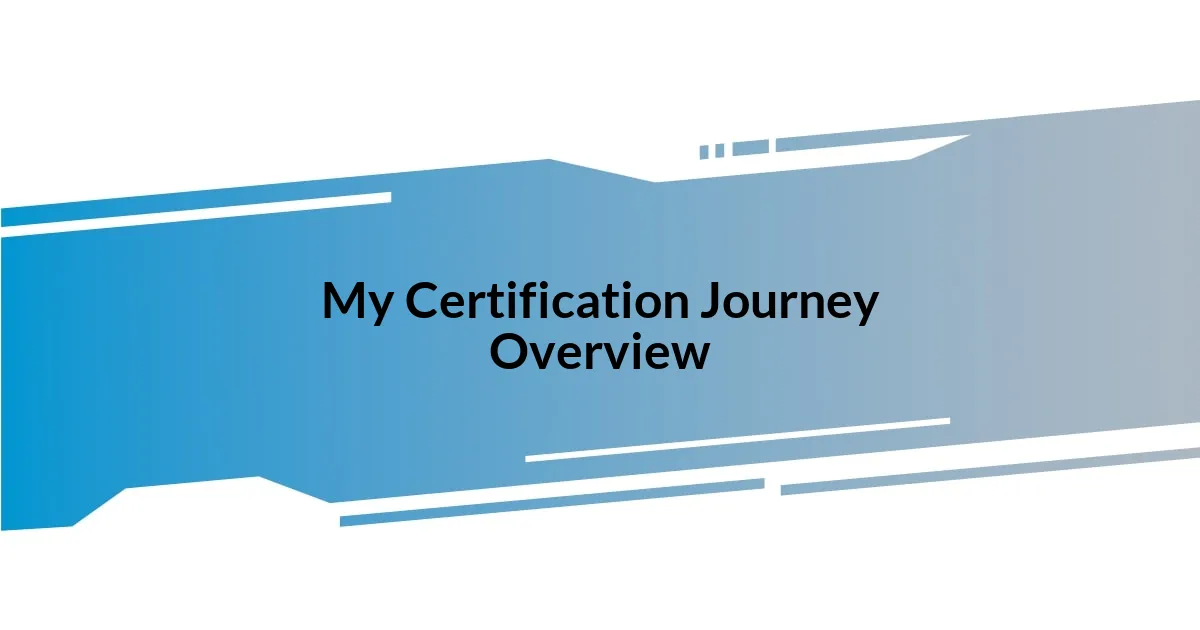
My Certification Journey Overview
My certification journey has been both enlightening and transformative. Each accomplishment, like becoming a Certified Ethical Hacker (CEH), not only taught me invaluable skills but also sparked a profound curiosity within me. I remember sitting at my desk, pouring over study materials late into the night, driven by the thrill of unraveling security puzzles. Can you relate to the feeling of diving deep into something that ignites your passion?
As I navigated through various certifications, I noticed how each one built upon the last. For instance, after earning my Certified Information Systems Security Professional (CISSP), I felt a surge of confidence that enabled me to tackle more complex security challenges. It was gratifying to see how this knowledge translated into real-world scenarios, from assessing risks in my organization to mentoring others in the field. Have you experienced a moment when a new concept suddenly clicked while you were studying?
Looking back, I realize that every certification I pursued played a crucial role in shaping my professional identity. The milestones weren’t just about checking boxes; they represented dedicated effort and a commitment to lifelong learning. It’s nearly humbling to think about how these achievements have equipped me to contribute meaningfully to my team and the industry. Isn’t it fascinating how each step can lead to a new realization about your potential?
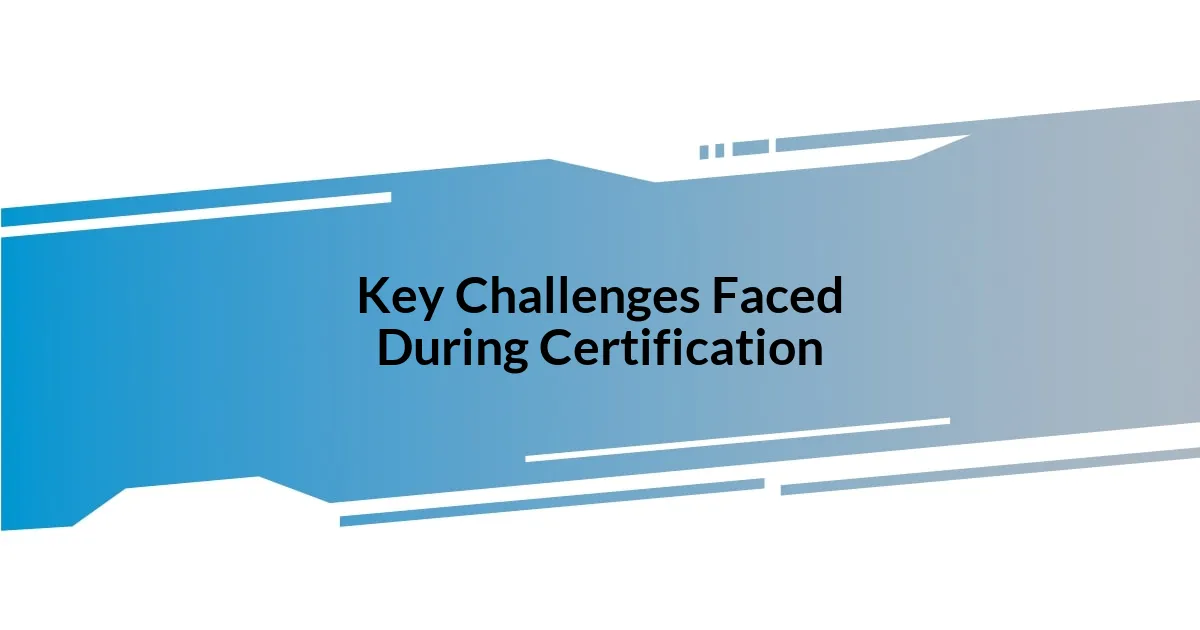
Key Challenges Faced During Certification
Despite the rewarding nature of obtaining certifications in cybersecurity, I encountered several challenges along the way. One notable hurdle was the sheer volume of information to absorb; it’s overwhelming when each subject can span countless pages and nuanced details. I vividly remember staring at my notes and feeling the weight of it all, questioning if I could truly grasp everything needed to pass an exam.
Another challenge that loomed over my certification journey was balancing work, family, and study time. I recollect many late nights where I had to choose between sleep and squeezing in a few more chapters. How do you juggle the demands of life while pursuing something as comprehensive as a cybersecurity certification? For me, it required setting strict schedules and carving out blocks of time dedicated solely to studying, no distractions allowed.
Furthermore, the anxiety that comes with test day itself can be daunting. I’ve been there, pacing back and forth before an exam, feeling every bit of self-doubt creep in. I found it helpful to gather my thoughts through deep breathing exercises before the big day. What strategies did I employ to combat that pre-exam tension? It was all about mental preparation and reminding myself of the hard work I’d put in leading up to that moment, transforming that anxiety into a focus on my capabilities.
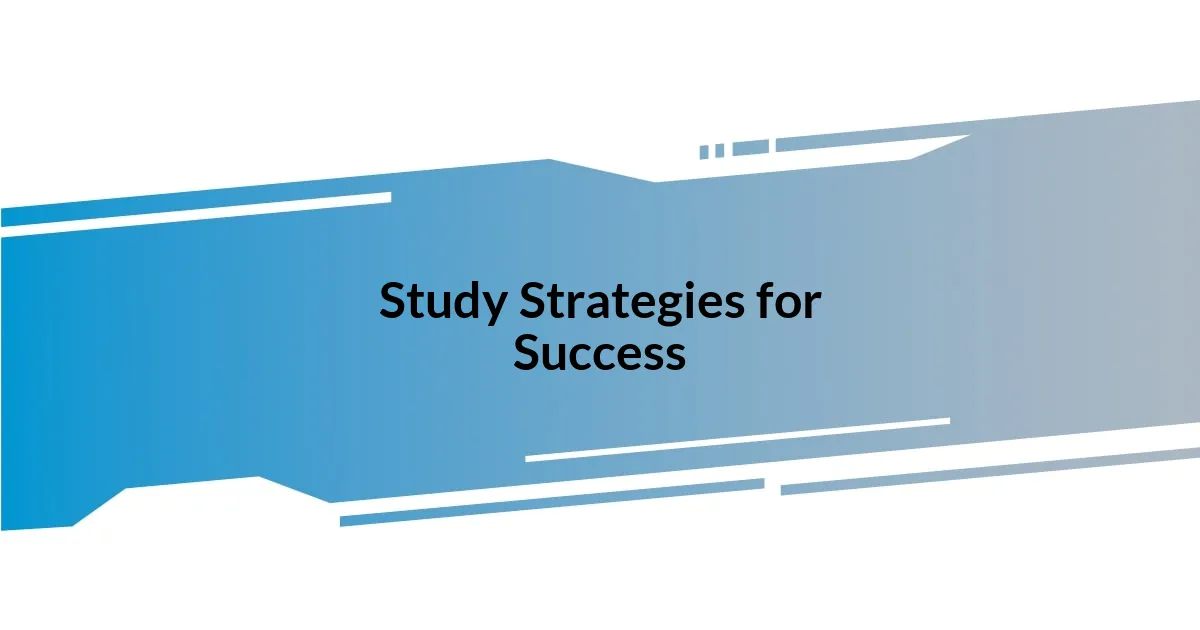
Study Strategies for Success
When it comes to studying for cybersecurity certifications, I’ve discovered that breaking information down into manageable chunks is incredibly effective. I remember quite vividly how overwhelming certain topics felt at first. It wasn’t until I organized my study materials into smaller sections that I began to feel a sense of control. Have you ever experienced the sudden clarity that comes from simplifying a complex topic?
Another strategy that proved valuable for me was incorporating real-world scenarios into my study routine. For instance, when prepping for the CISSP exam, I would relate concepts to actual incidents in the cybersecurity landscape. This approach not only made the material stick but also added a layer of relevance that kept me engaged. Can you think of a time when linking theory to practice enhanced your learning experience?
Lastly, I found that actively engaging with peers—through online forums or study groups—elevated my preparation. There were moments when discussing a challenging concept with others illuminated it in ways I couldn’t have on my own. I still recall the excitement after a lively debate on ethical hacking strategies that helped solidify my understanding. Have you ever shared your insights with a friend and walked away feeling more knowledgeable? This collective learning experience truly enriched my journey and made studying feel less isolating.
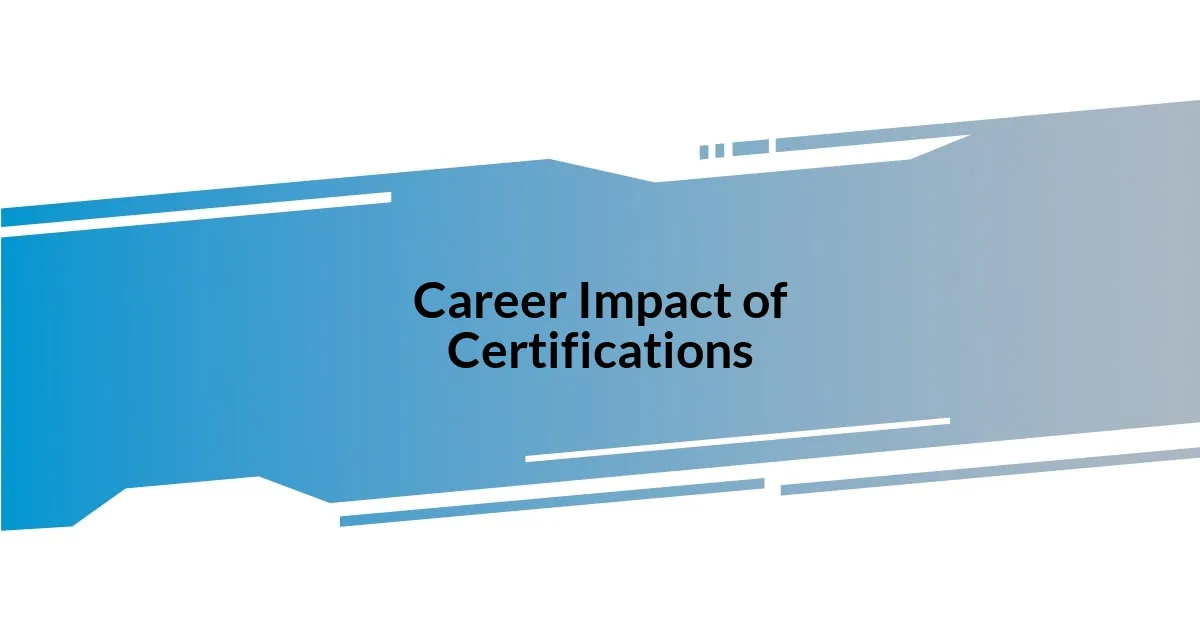
Career Impact of Certifications
Earning certifications in cybersecurity has undeniably propelled my career forward in ways I hadn’t anticipated. After completing my first certification, I remember the surge of confidence I felt during job interviews. With each certification, not only did I gain technical skills, but I also found that employers viewed me as a more credible candidate. Isn’t it fascinating how a piece of paper can transform the way we see ourselves and how others perceive us?
As I moved up the ranks in my career, the impact of these certifications became increasingly evident. Each new credential opened doors to advanced job roles that I once thought were out of reach. I had an eye-opening moment during a networking event when a recruiter specifically mentioned looking for candidates with certain certifications. It struck me how crucial these qualifications are in differentiating myself in a competitive job market. Have you ever considered how many opportunities you may be missing without those credentials?
Moreover, I’ve witnessed firsthand how certifications can lead to significant salary increases. The moment I received my Certified Information Systems Security Professional (CISSP) certification, my compensation package improved markedly. I remember thinking, “Wow, all those late-night study sessions truly paid off!” It’s interesting to think about how investing in our education not only enhances our skills but also leads to tangible financial rewards. Isn’t it worthwhile to consider how pursuing certifications can reshape our professional trajectories?